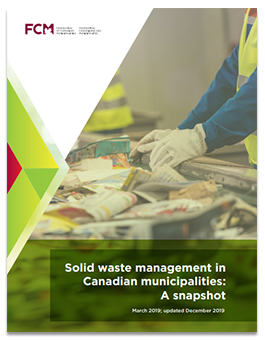 Expanding responsibility for producers to include the post-consumer stage of their products is a key solution for financial and environmental sustainability in the waste sector. That’s one finding of this Green Municipal Fund (GMF) report highlighting waste sector trends, key factors affecting municipalities’ ability to drive change, and best practices with economic, social and environmental benefits.
Expanding responsibility for producers to include the post-consumer stage of their products is a key solution for financial and environmental sustainability in the waste sector. That’s one finding of this Green Municipal Fund (GMF) report highlighting waste sector trends, key factors affecting municipalities’ ability to drive change, and best practices with economic, social and environmental benefits.
This snapshot focuses on practices that fall into four categories:
- circular economy approaches
- new technologies
- integrated solid waste programming
- mandatory and economic instruments
The City of Beaconsfield, QC provides an example of the last category. They piloted a highly successful pay-as-you-throw (PAYT) waste collection system that allows people to choose a smaller bin or less frequent pick-up and save money in the process. The results: 50 percent less landfill waste and cost savings of 40 percent to the municipality.
In addition to the emphasis on extended producer responsibility (EPR), the report draws several other conclusions, including:
- Global partnerships among large municipalities will continue to drive change.
- Organics diversion is becoming more mainstream and has the potential for significant emission reductions.
- Public awareness and targeted education in the industrial, commercial and institutional (ICI) sector can facilitate success with new projects.
Find more details, examples and conclusions in the report.
About the Green Municipal Fund
The Green Municipal Fund is a $1 billion program, delivered by the Federation of Canadian Municipalities and funded by the Government of Canada. Through its unique mix of training, resources and funding, GMF fuels local initiatives that build better lives for millions of Canadians while tackling pressing environmental and climate challenges.

